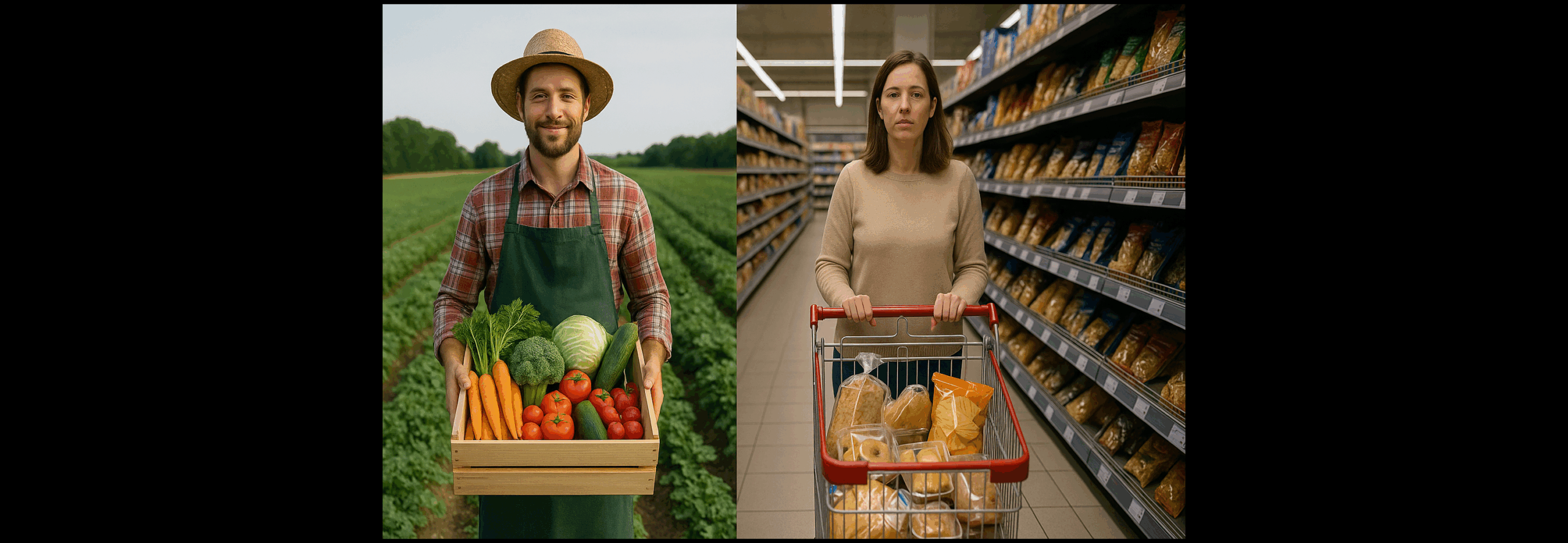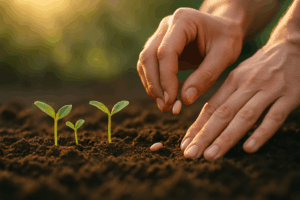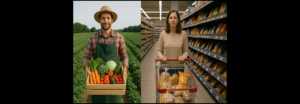A closer look at the unseen costs of convenience — and why local food might just be our way forward.
At the start of the 20th century, supermarkets were a revolution. They streamlined access to food, helped stabilise prices, and made groceries affordable and available to a growing population. For many families, they meant choice, ease, and a way to get by during hard times.
But a century later, their role has evolved, and not necessarily for the better.
Today, a handful of multinational supermarket chains control the vast majority of what lands on our plates. They decide what food is grown, how it’s processed, when it’s delivered, and at what price it’s sold. And that level of control comes at a cost, one that’s rarely seen on a price tag.
The Price of Power
It’s easy to forget that behind every pack of carrots or bottle of juice is a producer. A farmer, a grower, a maker. Someone who depends on that sale to make a living.
But for small-scale producers, working with supermarkets often means playing by impossible rules:
- Tight margins that leave no room for fluctuation in costs
- Standardisation that excludes misshapen vegetables or varieties that don’t fit the supermarket mould
- Payment delays that strain already fragile operations
In the UK alone, studies have shown that many farmers earn less than minimum wage after costs. Some are forced to throw away edible produce that doesn’t meet cosmetic standards. And the result? Fewer and fewer local growers can survive, and more of our food supply falls into the hands of the few.
The Illusion of Choice
Walk through any supermarket, and it seems like you have endless options. But look closer, and much of what’s on offer comes from the same industrial system: highly processed, ultra-standardised, and designed for shelf life, not nutrition.
What’s worse, supermarkets increasingly blur the line between supply and demand.
They say they stock strawberries in February or grapes in October “because people want them.” But here’s the truth: if they weren’t offered, most people wouldn’t ask.
It’s manufactured demand, not consumer need.
A study by the University of Oxford found that out-of-season produce, like strawberries flown from Egypt in winter, can have a carbon footprint up to 10 times higher than seasonal, local alternatives. Yet these imports flood the shelves year-round, weakening the value of truly seasonal food and eroding our connection to the rhythms of nature.
What We Lose
When every product is available every day, seasonality loses its meaning.
When apples come from New Zealand and grape from India, regardless of time or place, local harvests are sidelined. And when everything is wrapped in plastic and priced by algorithms, food becomes just another product, stripped of story and origin.
We lose:
- Diversity — heirloom varieties and traditional crops vanish in favour of uniformity
- Sustainability — food travels thousands of kilometres, burning fuel and emitting CO₂
- Culture — local food traditions fade when supermarkets dictate what we eat
And most dangerously, we lose resilience. Because when food is centralised, a disruption, drought, war, market volatility, can ripple through the entire chain.
Rebalancing the Table
We’re not saying supermarkets are evil. They’ve done their part. But in today’s world, they’re no longer fit for the role of food guardian. Profit has overtaken purpose. And unless we rebalance the system, we’ll continue to pay, with our health, our environment, and our communities.
That’s why at Maybee, we work differently.
We buy from nearby growers.
We follow the seasons.
We cook with what’s available, not what sells best in focus groups.
Because we believe food should be a reflection of where you are, not a carbon copy of what’s convenient.
What You Can Do
Changing the system doesn’t mean boycotting your local supermarket overnight.
But it starts with awareness.
Next time you shop:
- Check where your food comes from: what country is listed?
- Ask yourself: Is this in season here?
- Learn what produce grows locally this month: this seasonal calendar is a great place to start for the UK.
- Support your farmer’s market, food cooperative, or local producer: even once a week helps.
Because the choices we make, quietly, consistently, are powerful.
They can either reinforce a broken system, or build something new.
Let’s start building.




